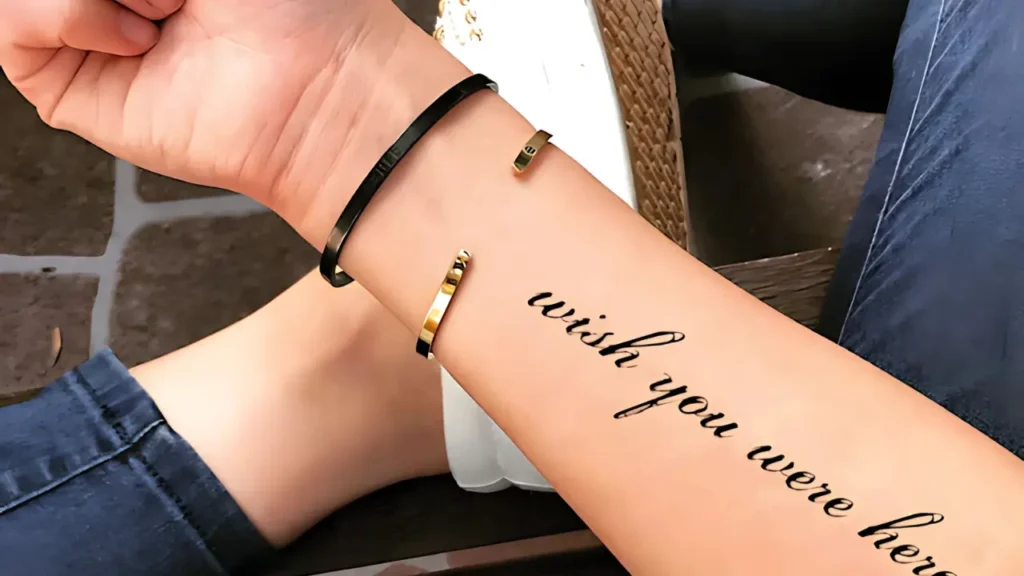Taking a tattoo is a significant step, particularly in the lives of teenagers. Regarding this, the age at which one could get a tattoo varies with state or country laws present. Everywhere is no tattoo without parental consent; in some places you can do it only if you are 18.
There are certain rules which are necessary to be followed and these permanent tattoos should not be done without thinking of the consequences.
What Are Tattoos?
Tattoos are news trends that involve creating graphics or pictures by implanting ink into the skin. These designs can be either small and localized or extensive, with results that are typically permanent. For minors or individuals of minimum age, obtaining a tattoo usually requires parental consent. As tattoos continue to gain popularity in the news trends, it is crucial for young people to understand their significance, the safety measures involved, and the legal aspects of getting one responsibly.
Are There Different Types of Tattoos?
- Traditional: Bold lines and bright colors.
- Realistic: Designs that look like photographs.
- Tribal: Intricate patterns often in black.
- Watercolor: Bright and splashed with color.
- Minimalist: Simple and small designs.
What’s the Legal Age to Get a Tattoo?
The legal age of tattooing is different in various states. In many areas, you have to be 18 years old to get a tattoo and do not need parental consent. For children below the age of 18, it might be necessary to seek parental consent before making the order.
It is crucial to always refer to the legal provisions of your jurisdiction to determine the specific legal requirements there.
Can You Get a Tattoo at 16 with Parental Consent?

Getting a tattoo, for instance, is legal at an earlier age of 16 with the permission of the parents as is the case with piercings. However, rules differ with region. It is always wise to consult the laws of a particular area to know whether one needs permission from the parent or not when minors are involved.
Another consideration is that of safety and legal compliance regarding the tattoo artist’s treatment of minor clients.
How Do You Choose a Safe Tattoo Artist?
- Check Reviews: Look for positive feedback from others.
- Visit the Studio: Ensure it’s clean and well-organized.
- Ask About Experience: The artist should have experience with body art.
- Review Their Work: Look at their past tattoos to ensure quality.
What Are the Health Risks of Tattoos?
Getting a tattoo has health risks, especially if you tattoo a minor.
- Infections: Dirty tools or improper care can cause infections.
- Allergic Reactions: Some people may be allergic to tattoo ink.
- Scarring: Poorly done tattoos can leave permanent scars.
Can Tattoos Cause Infections?
Tattoos are anyway unhealthy; they must be done correctly to avoid infections. At the age of 18 and above, infections may arise due to unhygienic tools used by the artist or negligence on the side of the individual.
To prevent such issues and maintain your tattoo safe and healthy, you should always select a qualified tattooer and obey the aftercare guidelines.
Are Allergic Reactions to Tattoos Possible?
It is possible to have allergic reactions to tattoo pigments, although this is rare. Others may develop some reactions on the skin such as redness, itching, or swelling due to the ink used in the tattooed body.
Despite being of legal age or having notarized consent, it is wise for one to do a skin test to ensure one will not react negatively to the tattoo.
How Do Different Countries Handle Tattoo Age Limits?
Currently, the legal sanctions for getting a tattoo entail different age limits in several countries. In many places, one is only allowed to have a tattoo at 18 years of age without the permission of their parents.
However, the mentioned countries have different guidelines and permit having tattoos at a younger age if the parent consents. To know the rules regarding the age of tattooing, it is advisable to look at the laws within the countries.
How Should You Talk to Your Teen About Tattoos?
If you want to discuss tattoos with a teen, the first thing that you should do is listen to their arguments. Explain how long tattoos last and whether there are any health issues associated with getting them, such as infections.
In any case, how come choosing a safe, licensed artist matters so much? If you have any doubts about their decision-making, remind them but do so kindly and persuasively.
Conclusion
Timing on when one should get a tattoo is very crucial, especially for teens. Knowledge of the legal age, health risks, and parental consent are essential. Furthermore, it is important to select an appropriate licensed artist.
As mentioned earlier at the age of 18, making the right decision from a talented artist enables one to have the best and safest experience with tattooing.
FAQs:
What is the legal age to get a tattoo?
The legal age to get a tattoo varies by country and state, but in many places, you must be 18 years old. Some regions allow minors to get tattoos with parental consent.
Can you get a tattoo at 16 with parental consent?
In some places, you can get a tattoo at 16 with parental consent. However, laws differ, so it’s important to check the regulations in your area.
Why is there an age limit for getting tattoos?
Age limits exist to protect minors from making permanent decisions without full understanding and to ensure they choose safe and reputable tattoo artists.
Are there different age requirements for tattooing in different countries?
Yes, tattoo age requirements vary by country. For example, in some European countries, the minimum age is 18, while others may allow younger teens to get tattoos with parental consent.
What happens if a minor gets a tattoo without parental consent?
If a minor gets a tattoo without parental consent in a region where it’s required, both the minor and the tattoo artist could face legal consequences.
What should parents know about tattoos and teens?
Parents should understand the legal age for tattoos, discuss the potential risks and responsibilities with their teens, and ensure their child chooses a safe and reputable tattoo artist.
How can a teen care for a new tattoo?
A teen should follow aftercare instructions carefully, such as keeping the tattoo clean and moisturized, avoiding sun exposure, and not picking at scabs to ensure proper healing.
What are the risks of getting a tattoo as a minor?
Risks include infection, allergic reactions, and regret over a permanent decision made at a young age. It’s important to fully understand these risks before getting a tattoo.
Can tattoo age laws change?
Yes, tattoo age laws can change, so it’s always a good idea to check the most current regulations in your area before getting a tattoo.



